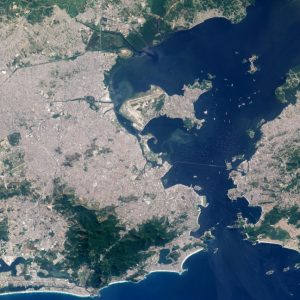The Stream, August 18: Degraded Watersheds Increase Water Treatment Costs Globally
The Global Rundown
Cities around the world are paying more for clean water in part due to the degradation of their source watersheds, according to a new study. Monsoon floods in Dhaka could become much more severe if problems with drainage infrastructure and wetland loss are not addressed. Sand deposited by floods along the Brahmaputra River poses a significant challenge for farmers in India. Rising sea levels and coastal erosion in Louisiana threaten billions of dollars of energy infrastructure. A cholera outbreak has emerged in southwestern Burundi. Communities near Finland’s Viiankiaapa protected area have raised concerns about a potential mine.
“In some areas on the north bank of the Brahmaputra, the river is taking away the top fertile layer of soil, and started leaving behind five-six feet of sand. It will take at least five years, maybe even seven or eight years, to reclaim this soil. Until then nothing will grow on it.” –Partha Jyoti Das, head of the water, climate and hazard division at Aaranyak, a think tank based in Guwahati, India, on the changing composition of the sediment left behind when floodwaters from the Brahmaputra recede. Experts blame the shift from silt to sand on climate change, dams, and protective embankments along the river. (The Third Pole)
By The Numbers
$100 billion Value of energy infrastructure in Louisiana that is at risk from rising sea levels and coastal erosion. With a shortfall in public funding, oil companies that operate in the state are being asked to invest in environmental restoration projects that will protect coastlines — and infrastructure — from storms and floods. Bloomberg
95 cholera cases Number recorded in southwestern Burundi over the past three weeks. The outbreak may be linked to contaminated water from Lake Tanganyika, which is used by some poor neighborhoods as a drinking water source during the dry season. Xinhua
Science, Studies, And Reports
Approximately 90 percent of the watersheds that provide water to cities around the globe have been degraded to some extent over the past century, according to a study published in the Proceedings of the National Academy of Sciences. As a result, in nearly a third of those cities water treatment costs increased an average of 53 percent. PNAS
On The Radar
The effects of annual monsoon floods in Dhaka, the capital of Bangladesh, could become much more severe in the future, according to water experts. More intense storms due to climate change, trash-clogged drainage systems, and the loss of wetlands all contribute to increasingly dangerous conditions when the city’s surrounding rivers flood. Inter Press Service
Plans by mining company Anglo American to develop a copper, nickel, and platinum deposit near Finland’s Viiankiaapa reserve have encountered opposition from local reindeer herders and environmentalists concerned about water contamination and other pollution. Fauna and Flora International, a conservation group based in the United Kingdom, is also under fire for agreeing to assess the environmental value of wildlife habitat near the site, as well as determine if other areas of equal value exist in the region. Guardian
A news correspondent for Circle of Blue based out of Hawaii. She writes The Stream, Circle of Blue’s daily digest of international water news trends. Her interests include food security, ecology and the Great Lakes.
Contact Codi Kozacek





